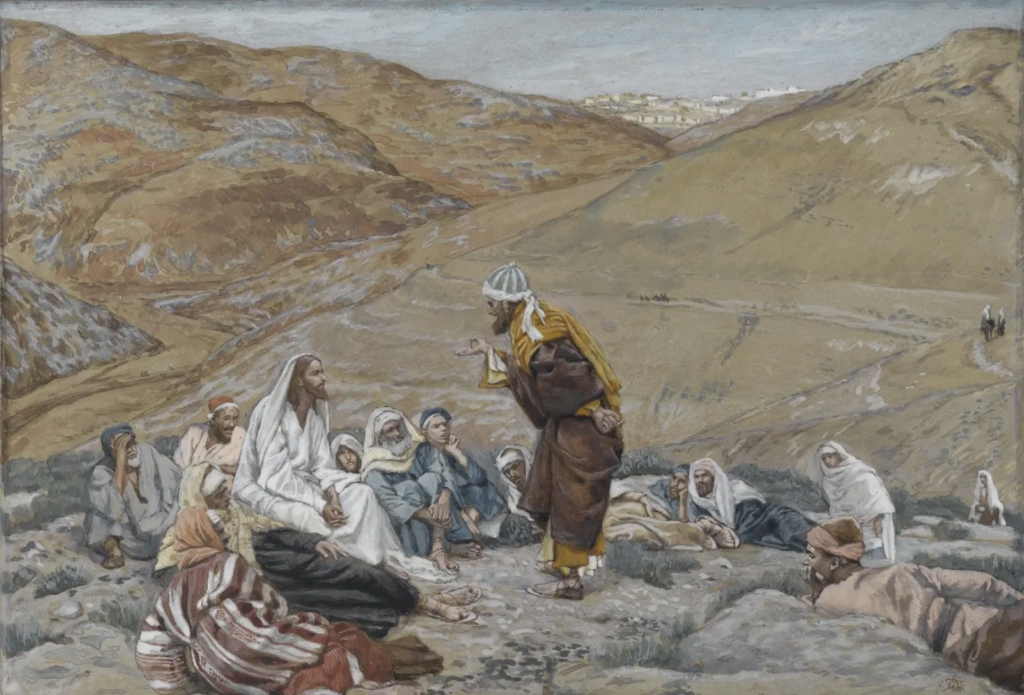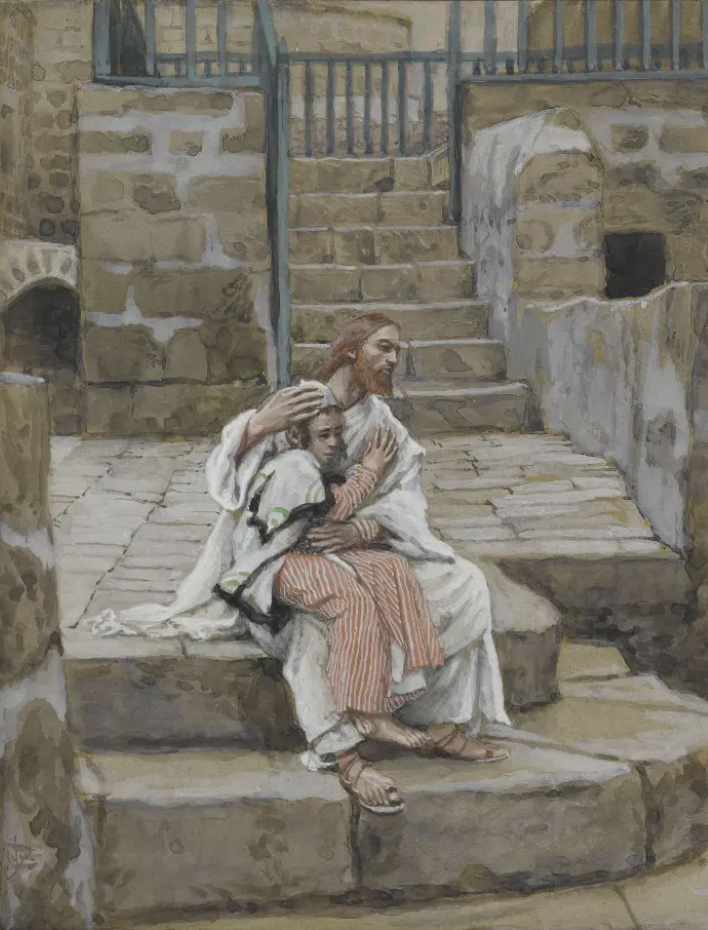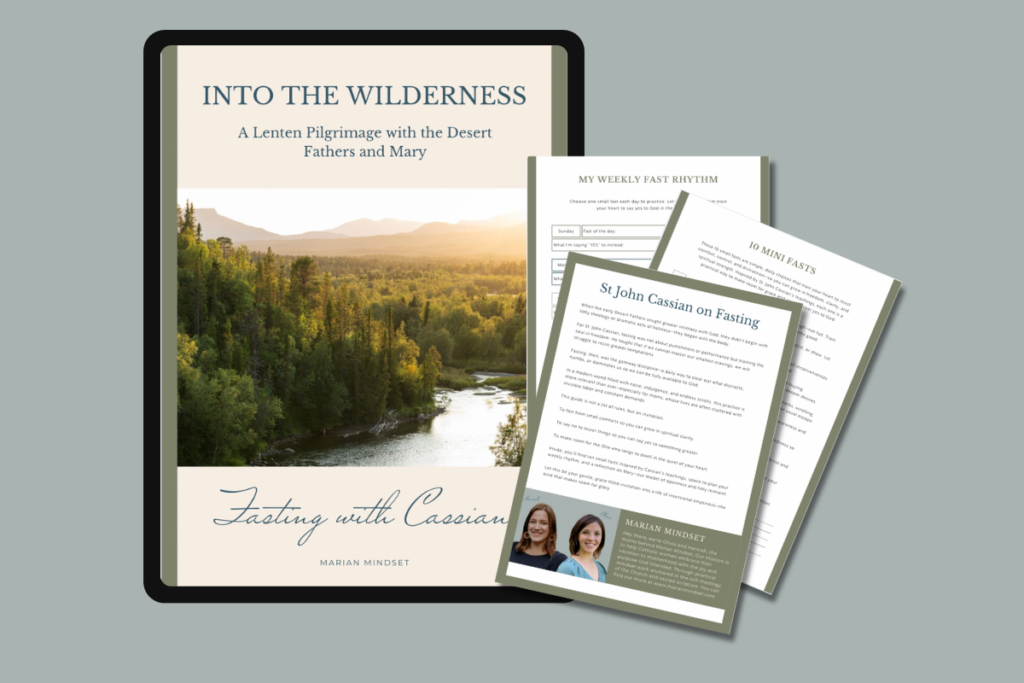I had a friend in college who was the kind of person we’d all love to be. She was incredibly thoughtful—the type who’d remember something you mentioned in passing weeks ago, ask about your parents by name, and show up with your favorite snack just because. The whole shebang.
AND
She was also the hangriest person I have ever met. (If you’re unfamiliar, hangry is when hunger turns you into an uncharacteristically irritable, short-tempered version of yourself. Think Snickers commercial.)
It was wild to watch her transform from happy Bilbo at his eleventy-first birthday to Gollum clutching the ring and trying to shove you into Mount Doom in 20 seconds flat. And then, just as quickly, after we’d fling a granola bar in her general direction, she’d morph back into our loveable friend.
But here’s the wild part…this isn’t just a modern-day problem. An early desert father named John Cassian had a lot to say about this very thing.
Cassian was a monastic teacher in the 4th and 5th centuries, and he wrote extensively about the spiritual life and self-discipline. He believed that gluttony isn’t just about food—it’s about control. If we can’t even handle hunger without turning into Gollum, how will we ever have the self-mastery to resist bigger temptations?
“He will never be able to check the motions of a burning lust, who cannot restrain the desires of the appetite.” (Institutes 5)
Think about that for a second… If we can’t control what’s on our plate, how can we possibly resist what’s waiting on our screen, that third cup of coffee, or the gossip disguised as concern?
In other words? Fasting is spiritual training.
More than just seeing if you can survive skipping your favorite meal of the day (which, in my case, is all of them), fasting for the early church was about mastering your desires so you could train for bigger battles and win the freedom Jesus promises us when our hearts and desires belong to Him FIRST.
In this blog, we’re going to dive deeper into Cassian’s wisdom on fasting—not just as a test of endurance but as a tool for spiritual freedom. We’ll explore why the early Church saw fasting as more than skipping meals, how it helps us gain mastery over our desires, and what it means for our modern lives, where we’re constantly bombarded with comfort, indulgence, and distraction.

The one discipline that unlocks the rest
Fasting is one of those disciplines we all know about but often misunderstand. We tend to think of it as just about food—giving up snacks, sugar, or caffeine. Cassian notes that fasting looks different person to person because of our bodies and capacities. But for all the faithful, “there is one and the same rule of restraint to everybody as regards continence of mind, and the virtue of the spirit.” (Institutes 5)
In other words? Fasting isn’t one-size-fits-all, but self-control is.
He goes on to say the goal of fasting is not merely self-denial, but the training of the soul toward purity, self-mastery, and deeper union with God.
Fasting is a means of subduing the desires of the flesh so that the mind and spirit can be clearer, stronger, and more receptive to divine things.
Okay, cool, got it. For many of us, this isn’t news. We know that fasting forces us to pause, resist, and reorder our desires. It’s a discipline that brings awareness to our hunger AND the deeper cravings we often try to satisfy with comfort, distraction, or indulgence.
But Cassian takes it a step further.
He believed that all our passions—gluttony, lust, anger, pride, greed—are interconnected. If we give in to one, we weaken our ability to resist the others. So he insisted that the very first step in pursuing self-mastery, purity of heart, and deeper union with God is this: learn to control your appetite.
The deeper threat here isn’t just over indulging in The Lord’s Chicken (Chick-fil-A), it’s giving way to those bodily desires and passions. It’s a warning we see from Paul in Romans 13:14, “Instead, put on the Lord Jesus Christ, and make no provision for the flesh, to gratify its desires.”
If we can’t resist seconds (or thirds), how will we resist pride, wrath, or envy? The battle begins at the table—but it doesn’t end there.
Cassian teaches that all the vices are linked. They don’t exist in separate boxes for us to deal with one at a time. They’re more like a tangled mess of cords, where pulling on one (say, gluttony) tightens the knot around another (like lust or pride). So when we work to untangle the passions, we start with gluttony, because it touches everything else.

Treat yourself (to some self-control)
But gluttony is sneaky. It’s one of the easiest passions to excuse. It’s the most socially accepted one (I’m thinking about my southern mamaw who was personally offended if you didn’t eat at least six chocolate chip pancakes at her breakfast table).
And it’s one we often ignore. Why? Because it doesn’t look like a problem. It’s not flashy or scandalous. No one’s pulling you aside to gently confront your third slice of pizza. In fact, food is often how we connect, celebrate, cope, and show love.
Even the Eucharist—the source and summit of our faith—is a meal. The word communion shares a root with community, and food has always been a central part of what draws people together. It’s sacred. It’s good.
And in a world that’s all about treating yourself, it’s easy to see overindulgence as harmless, even earned.
Also, we also tend to rank sins (with absolutely zero theological basis), and gluttony just doesn’t feel as serious as, say, lust, wrath, or greed. I mean, no one’s out here saying, “Yeah, it’s too bad Jim cheated on Sarah, but did you hear about Laura eating four donuts in the vestibule this morning?”
Exactly. Gluttony doesn’t raise eyebrows—it raises forks. It’s “little.” It’s casual.
But that’s exactly what makes it dangerous.
Because Cassian knew what we often forget: the “little” indulgences shape our hearts just as much as the big ones. If we constantly give in to every craving—no matter how small—we’re training ourselves to be ruled by our desires, not by the Spirit.
He writes: “He will never be able to check the motions of a burning lust, who cannot restrain the desires of the appetite.” (Institutes 5)
That’s a gut check (can’t decide if the pun was intended or not) if I’ve ever heard one. If we can’t say no to what’s on our plate, how will you say no when the stakes are higher?
This is why the early Church didn’t see fasting as just a seasonal Lenten discipline—they saw it as a daily weapon. To train the body and free ourselves from being ruled by our cravings.
And Cassian’s point is painfully relevant today. Because most of us aren’t out here being ruled by huge, dramatic sins—we’re ruled by small, habitual indulgences. The scroll, the snack, the third episode of a show we know we should’ve turned off when 2 am rolled around.
And listen, I’m not going to make you post it in the comments or anything, ehm, but some of y’all (myself included) have an Amazon cart with seven things waiting to pull the impulse trigger. 👀
This is where Cassian really challenges us. We have to take gluttony and fasting seriously. Because, “However great a city may be protected by the height of its walls and the strength of its closed gates, yet it is laid waste by the giving up of one postern however small.” (Institutes 11)
Translation: you can build the biggest, most fortified spiritual life—prayer routine on point, regular confession, solid theology—but if you leave just one little door open, the enemy still gets in.
So, what are we to do?
First, we look to Mary.

Making room for glory
Mother Mary was the opposite of indulgence. Where Eve took and ate in disobedience, Mary received and surrendered: “Let it be done to me according to your word.” Even when it meant giving up her only, beloved child.
That wasn’t a moment of passive agreement—it was the fruit of a soul trained to say yes to God, no matter what. Mary was empty in the way that we are called to be empty—an empty readiness, primed to receive.
She had nothing in her that clung to comfort or control. She lived the kind of spiritual freedom Cassian was after—the freedom that says yes without hesitation, because nothing else is in the way.
When we fast—whether from food or from the other things that numb, distract, or dominate us—we’re trying to make that same kind of space in our souls.
We’re saying: “I don’t want anything—no craving, no comfort, no habit—to get in the way of my yes.”
We’re trying to become people who can, like Mary, respond to God with open hands instead of full ones.
Fasting doesn’t just teach us to go without—it forms us into the kind of person who can hold Christ within, like Mary. And to do that, we need space. We need a heart that isn’t stuffed with noise, numbed by distraction, or addicted to our next little fix.
Because a cluttered soul has no room for glory.
When we are empty, we are ready.
When we are humble and temperate, we stop grasping at lesser things and finally become open—open to grace, to virtue, to God Himself.
Fasting reorders us. It clears out what’s unnecessary so we can be filled with what’s eternal. It prepares the way for Christ—not just once a year at Christmas, but daily, in the interior manger of the soul.
But what are some practical ways to do this? We start by understanding fasting doesn’t always look like food. In fact, some of the most powerful ones won’t touch your plate at all.

10 fasts (that mostly don’t have to do with food)
I want to make it clear, we are not called to the same vocation as the Desert Fathers. No one is asking you to survive on sunlight, locusts, and one almond. Most of us are not called to the extreme ascetic life in the wilderness. But we are called to live and work in the wilderness that is the modern age.
But we are called to fast.
We are called to make room.
We are called to live in the world—but not be mastered by it.
So no, we don’t need to swap the extra butter popcorn for a pile of dates and a clay jug.
But we do need to ask: what’s crowding out my “yes” to God?
Here are some practical ways we can practice making ourselves empty (insert personal caveats here about your own health and wellness—these are not commandments from God, just ideas):
1. Fast from second helpings (even if you’re still hungry): Try stopping at enough. Not full. Not stuffed. Just… enough. Say no to the impulse to keep going just because it tastes good. Practice choosing satisfaction over indulgence.
2. Fast from the scroll: Pick a window of time each day—maybe during lunch, maybe the first hour after waking up—where you don’t touch your phone. Put it in a drawer. Let your mind detox. Pay attention to how twitchy you feel, and use that space to pray or just breathe.
3. Fast from background noise: Turn off the podcast, the playlist, the TV running in the background. Commute in silence. Cook in quiet. Let your mind rest and notice what surfaces. Discomfort? Anxiety? Prayer? That’s where the formation begins.
4. Fast from immediate comfort: Take the stairs. Skip the sugar in your coffee. Take a shorter shower. Sleep without your phone in the room. Let yourself feel the inconvenience—and don’t panic. You’re training your heart to stop needing everything to be easy.
5. Fast from “just because” purchases: Next time you’re tempted to buy something random on Amazon, wait 24 hours. Deny the impulse for instant gratification. Let your desire sit for a while without having to be satisfied. And then, go back and ask yourself if you really need it.
6. Fast from self-soothing habits: Instead of reaching for your phone, snack, or shopping cart when you’re stressed, try sitting still and naming what you feel. Offer it to God. Even if it’s uncomfortable, you’re learning to run to Him first, not your go-to comfort fix.
7. Fast from excess words: Try a few hours (or even a day!) of intentional quiet. Don’t narrate every thought or fill silences in conversations. Practice listening more than you speak, and see what it reveals about your desire to be heard, noticed, or impressive.
8. Fast for the sake of listening: Create intentional moments in your day to do nothing—no podcast, no journaling, no music, no “productive prayer.” Just sit. Be still. Let your mind wander and wait. You’re not there to accomplish anything—you’re there to make space. God doesn’t compete with noise. He whispers. Fasting from constant input trains you to notice the tone of your inner life and to recognize when God is trying to speak beneath it.
9. Fast from needing to know the plan: We often fill the silence with strategies, next steps, or mental checklists for what we think God wants from us. But sometimes the holiest thing you can do is wait with open hands. Try fasting from the urge to figure it all out. Instead of asking God, “What’s next?”, try praying, “What are You saying here?” Receptivity is a posture of fasting—empty, quiet, and ready. Like Mary, who didn’t demand a five-year plan before saying yes to the angel. She just listened. And responded.
10. Fast from filling every moment: You don’t have to multitask your way to sainthood. Try leaving one pocket of your day unstructured and unscheduled. Don’t fill it. Don’t rush to make it “useful.” Just let it exist. Take a walk without headphones. Sit on the porch and watch the sky change. Light a candle and stare at it like a 14th-century mystic. Whatever it looks like—practice being available, not just efficient. God doesn’t always speak in burning bushes or thunderclaps. Sometimes He just waits for a moment when we finally stop filling every second—and look up.
Do all of these sound terrible? Yes.
But… that’s kind of the point.
Fasting pushes against everything our culture celebrates—immediacy, indulgence, ease, control. It reminds us that we are not our cravings, not our comforts, not our curated little bubbles of self-soothing.
Cassian knew that the path to self-mastery didn’t start with conquering huge sins—it started with the simple decision to stop letting your stomach (or your screen, or your impulses) call the shots. It started with saying no to the little things, so you could say yes to something greater.
And if that doesn’t sound super relatable—remember my hangry friend? The one who could go from thoughtful Bilbo to Gollum in under 20 seconds?
That’s all of us, honestly. We’re not just hungry for food—we’re hungry for comfort, control, stimulation, and validation. And when we don’t get it? We spiral.
Fasting is what teaches us to catch that spiral before it starts. To choose stillness over scrolling. Simplicity over excess. God over gratification.
And Mary—our model of perfect receptivity—shows us where that kind of freedom leads. A heart emptied of grasping becomes a heart filled with God. A will trained to listen becomes a will ready to respond.
So no, you don’t need to move to the desert or survive on wild honey and locusts.
But you do need to create space.
To make room.
To fast in little ways that remind your soul who’s in charge—and who you’re listening for.
Because the freedom you’re looking for?
The clarity?
The courage to say a full, fearless yes to God?
It starts with a small fast. And it leads to a greater feast.

Ready to make room for God in the everyday?
Download your free copy of Fasting with Cassian: A Rule of Life for Moms and discover how small, intentional fasts can train your heart for greater freedom, clarity, and peace. This beautifully designed one-page guide includes:
- 10 small fasts to help you resist comfort, distraction, and overindulgence
- Space to reflect on what God is telling you to look at in this Lenten season
- A space to create your weekly fasting rhythm
Whether you’re new to fasting or just looking for a gentle way to reconnect with God, this guide will help you practice saying no to the little things—so you can say yes to something greater.
Download it now and start making space!
Read the rest of the Lenten series:
Into the Wilderness: A Lenten Pilgrimage with the Desert Fathers and Mary (Part One)
Into the Wilderness (Part Two): St Anthony and the Desert Within
Into the Wilderness (Part Three): Abba Isaac and Prayer as Daily Bread
Into the Wilderness (Part Four): Evagrius Ponticus and Guarding Your Mind

+ show Comments
- Hide Comments
add a comment